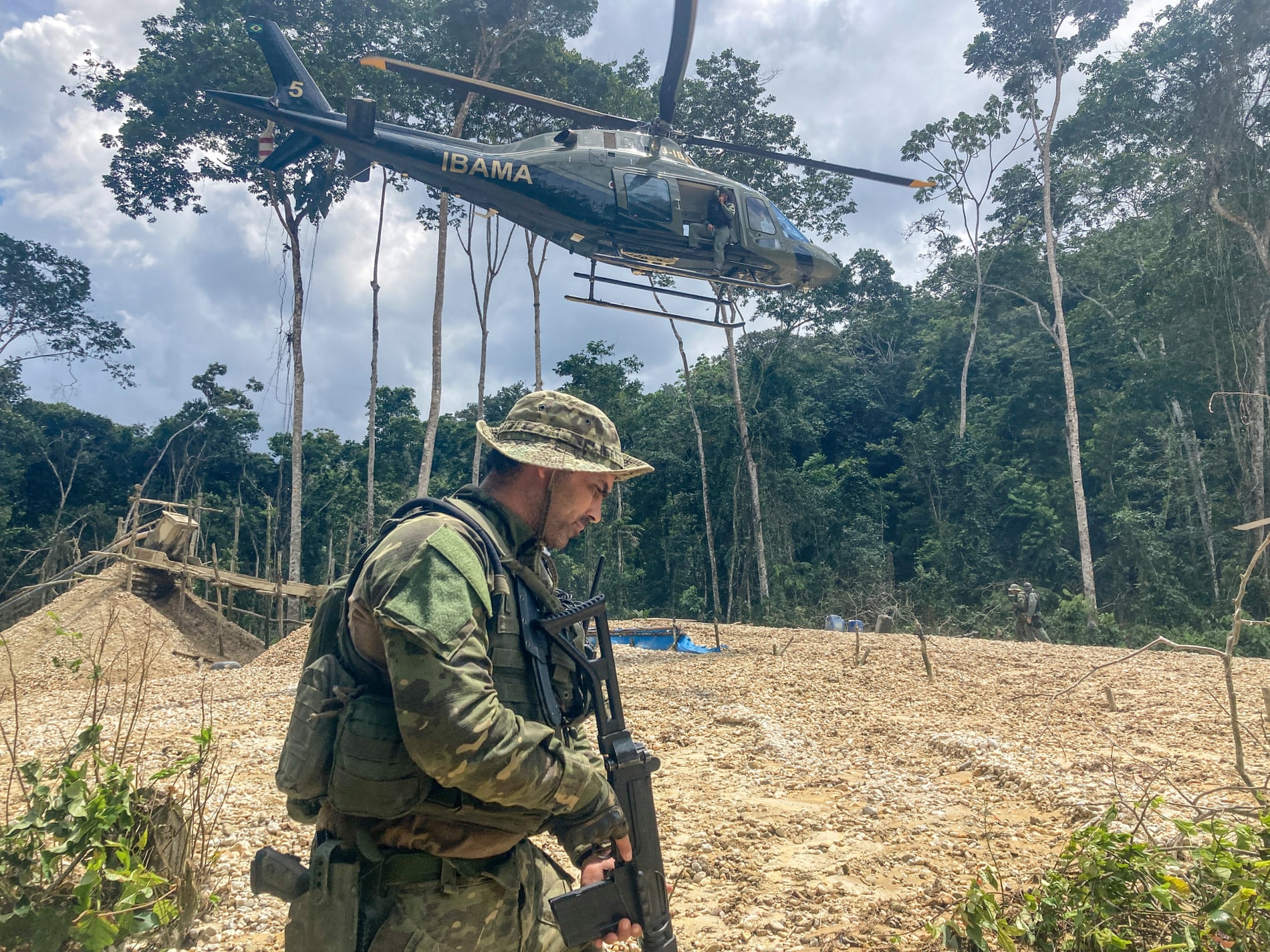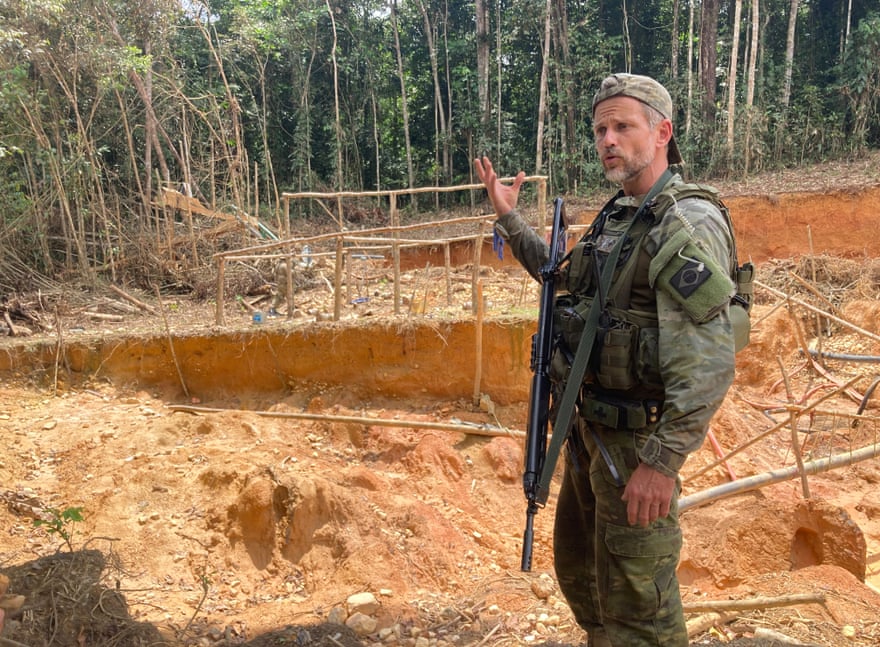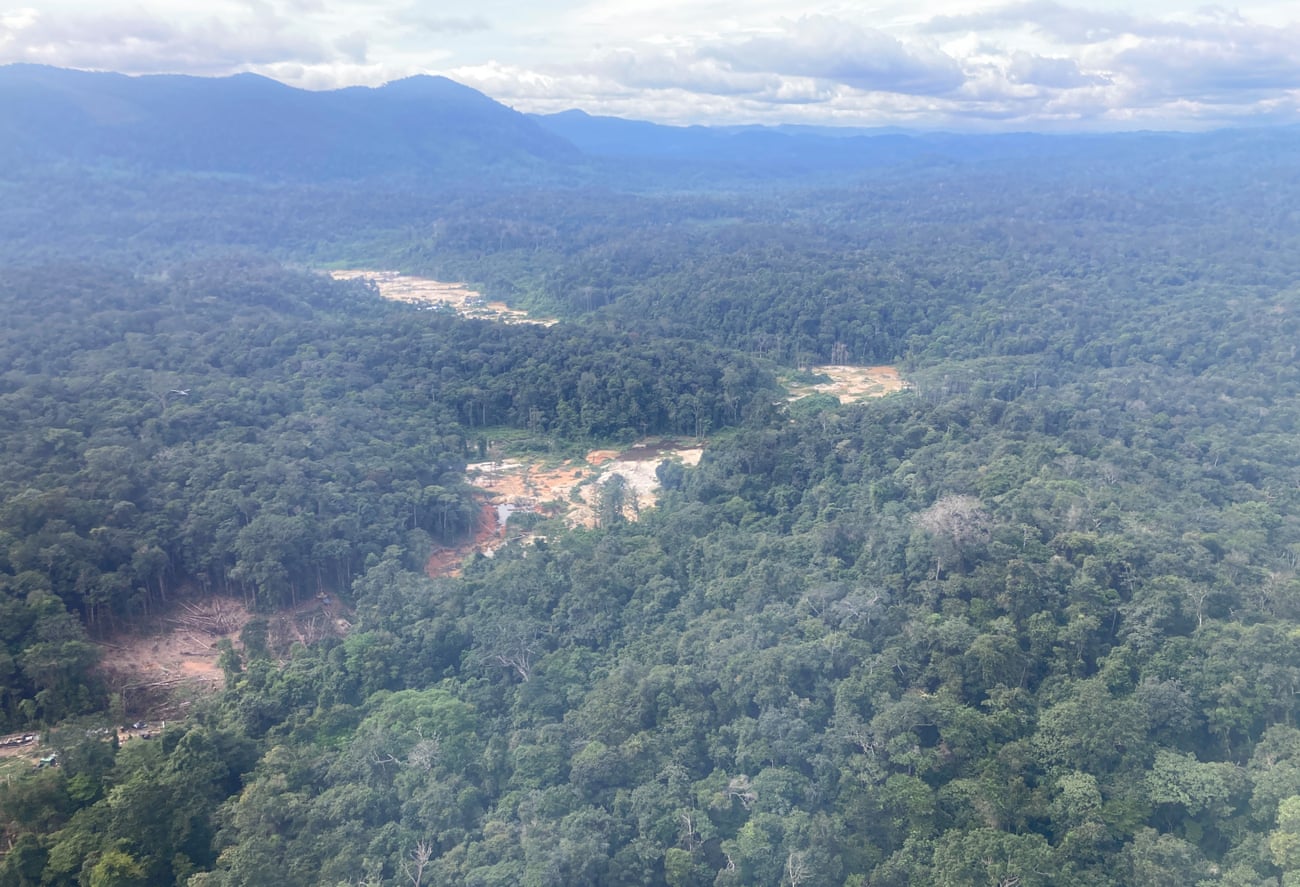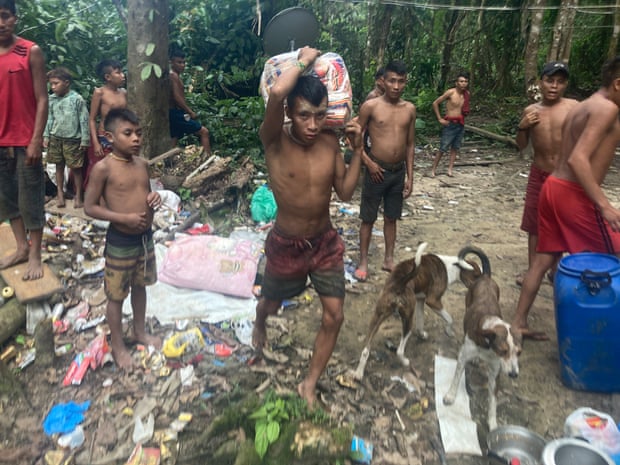
An elite unit is on a mission to expel the illegal miners who devastated Yanomami territory during Bolsonaro’s presidency
by Tom Phillips in the Yanomami Indigenous territory
For the last four years Brazil’s rainforests bled. “They bled like never before,” said Felipe Finger as he prepared to venture into the jungle with his assault rifle to staunch the environmental carnage inflicted on the Amazon under the former far-right president Jair Bolsonaro.
Moments later Finger, a mettlesome special forces commander for Brazil’s environmental protection agency, Ibama, was airborne in a single-engine helicopter, hurtling over the forest canopy towards the frontline of a ferocious war on nature and the Indigenous peoples who lived here long before Portuguese explorers arrived more than 500 years ago.

Felipe Finger, a special forces commander for Brazil’s environmental protection agency, Ibama, leads his troops on a mission to destroy illegal mines into the Yanomami Indigenous territory. Photograph: The Guardian
Felipe Finger, a special forces commander for Brazil’s environmental protection agency, Ibama, leads his troops on a mission to destroy illegal mines into the Yanomami Indigenous territory. Photograph: The Guardian
As Finger’s aircraft swooped down into a muddy clearing beside a Yanomami village, a handful of those miners scurried into the forest in their wellies in an attempt to avoid capture.
The motors fuelling their clandestine cassiterite mining operation were still growling as members of his six-strong unit leapt from their helicopters and fanned out across an apocalyptic landscape of sodden craters and fallen trees.
“Illegal mining on Yanomami land is finished,” declared Finger, a camouflage-clad forest engineer turned rainforest warrior whose team has been spearheading efforts to evict the prospectors since early February.
The raid in Xitei was part of what has been hailed by the government as a historic drive to expel miners from Yanomami lands and rescue the Amazon after four years of chaos, criminality and bloodshed such as that which saw the British journalist Dom Phillips and the Indigenous specialist Bruno Pereira murdered last June.
The Guardian was one of the first media organisations granted access to those efforts, traveling deep into Yanomami territory to accompany Finger’s elite squad, the Special Inspection Group (GEF).
The group’s agents gathered early last Friday at a camp on the Uraricoera River – one of the main arteries miners use to invade the territory, which is the size of Portugal and where about 30,000 Yanomami live in more than 300 villages.
Twenty-four hours earlier a gang of illegal miners – who the government has ordered to leave the territory by 6 April – had exchanged fire with troops who blockaded the waterway in order to cut off their supplies. One miner was shot in the face.
Shortly before 11am the agents took to the skies in two Squirrel helicopters and powered south-west towards Xitei where they had spotted a series of mines during a surveillance flight the previous day.
“This region has been absolutely devastated … there are villages that are now completely surrounded by the mines,” said Finger, 43.

Thirty minutes later his first target came into view. The helicopters corkscrewed down from a cloud-filled sky into a tawny gash in the forest where miners had been pillaging gold from protected Yanomami lands.
The miners had fled, abandoning their equipment in a muddy pit where a small brook once flowed. “They left in a hurry – just a few days ago,” Finger said as his crew trudged through their deserted encampment.
Clothes, empty packets of cigarettes and painkillers and spent 12-gauge shotgun cartridges littered the ground near a wooden sluice used to separate gold from gravel and dirt.
After setting fire to the sluice and the motors that powered hoses used to blast away soil, Finger’s group reboarded their helicopters and raced towards their second target: a larger cluster of mines near the Venezuelan border.
When the Guardian last visited the Xitei region in 2007, it was a sea of largely pristine rainforest dotted with traditional communal huts and deactivated clandestine airstrips that were dynamited during the last major operation to evict miners, in the early 1990s.
Fifteen years later the jungle around Xitei has been shattered. Immense sand-coloured lacerations have replaced dark green woodlands. Ramshackle mining campsites stand where tapirs and deers once roamed. Unknown quantities of mercury have polluted rivers, poisoning the fish on which the Yanomami rely.

Yanomami villagers carry away the supplies from an illegal mining camp raided by environmental troops near the village of Xitei. Photograph: Tom Phillips/The Guardian
Dário Kopenawa, a prominent Yanomami leader, compared the environmental desecration to leishmaniasis, a disease carried by sand flies that causes horrific skin lesions and ulcers.
“Our land is so sick. Our rivers are sick. The forest’s sick … the air we breathe is sick,” he said, using a Yanomami word to describe the catastrophe that unfolded under Bolsonaro, whose anti-environmental rhetoric and crippling of protection agencies such as Ibama caused deforestation to soar.
“I would call it onokãe,” Kopenawa said. “It means a genocide which kills people, spills blood and ends lives.”
As the Ibama team landed in the cassiterite quarry, its operators scattered. Dozens of Yanomami villagers emerged from the jungle, curious about the arrival of Finger’s flying squad.
The women wore traditional red loincloths and had yellow and white beads draped over their bare chests. The men wore jaguar teeth necklaces and clutched arrows adorned with the black feathers of pheasant-like curassow birds. The children sported flip-flops and football shirts, given as gifts by the miners.
The men shook their heads when asked to name Brazil’s current and former presidents. But the consequences of Bolsonaro’s incitement of environmental crime were visible all around: the wrecked forest, the bulging sacks of illegally extracted minerals, and the filthy encampment where beer cans and tins of sardines were strewn on the ground.
Nearby, Finger’s team chased down one fugitive miner, a former butcher named Edmilson Dias from the mid-western state of Goiás.
Dias, a weather-beaten 39-year-old whose eight years toiling in the mines had given him the appearance of a far older man, voted for Lula in last October’s crunch election. But the miner lambasted the new president’s crackdown and insisted it would fail.
“Mining’s a fever,” the dejected miner said as he sat on a tree trunk flanked by Finger’s heavily armed troops. “If you kick me out of this mine … I’ll just go somewhere else because illegal mining will never end.”
Similar defiance could be heard around the swimming pool of the best hotel in Boa Vista, the city nearest to the Yanomami enclave. On a recent afternoon one portly mining boss sat there, swigging beer and bragging how his team had buried its gear in the jungle to prevent troops destroying it. Miners had doused the earth over the concealed objects with petrol to help them relocate their equipment by stopping the forest from growing back.
The boss predicted Lula’s clampdown would fade after six months, allowing miners to resume their multimillion dollar activities in more than 200 pits. But Lula allies are adamant they have come to the Yanomami territory to stay.
“This is Lula’s pledge and we’re all working … so this pledge becomes reality. We are determined to make this work,” said the environment minister, Marina Silva, vowing to defend other Indigenous territories ravaged by illegal mining such as those of the Munduruku and Kayapó peoples.
For the Yanomami such pledges are a matter of life and death. At least 570 Yanomami children reportedly died of curable diseases during Bolsonaro’s administration, partly because rampant mining gangs had caused an explosion of malaria and made it impossible for health workers to operate.
“This is a crime. There’s no other name for it – an attempted genocide,” said Silva, denouncing the “ethically, politically, morally and spiritually degrading” conditions she believed the Yanomami had been deliberately subjected to under Bolsonaro.
André Siqueira, a malaria expert who visited the Yanomami territory recently to assess the health emergency, described horrifying scenes of malnourishment and neglect. “I saw five-year-old children who weighed less than my two-year-old. Even on trips to Africa I’d never seen such levels of malnutrition. I’d only seen it in books,” he said.
Bruce Albert, an anthropologist who has worked with the Yanomami since the 70s, when miners first stormed their territory, accused Bolsonaro of seeking to “totally annihilate” the Yanomami by sabotaging efforts to shield the lands they are thought to have inhabited for thousands of years.
“Bolsonaro’s plan was a species of genocide by means of intentional negligence,” Albert said of the politician, who he believed was obsessed with military dictatorship-era conspiracy theories that hostile foreign powers wanted to annex the border region by inciting an Indigenous separatist movement. “And if Bolsonaro had had another four years [in power] his plan would have succeeded.”
Brazil’s former president has called such accusations a leftist “farce”. Dias also rejected claims miners were destroying the Yanomami.
“When our machines are all working they eat well and they live well,” he said reeling off the names of three supposed Yanomami collaborators. “Miners aren’t crooks and what they are doing to us is a total disgrace.”
Dias also denied miners were collecting gold with the use of mercury, which can cause birth defects, kidney damage and even death. Moments later, however, Finger emerged from Dias’s shack brandishing a plastic flask filled with the toxic heavy metal. “It’s not just dangerous, it’s lethal – for them [the miners] and for the Indigenous,” he bristled.
Dias confessed to paying about five grams of gold (£240) for the silvery substance. “It comes from X-ray machines, hospitals, that sort of thing,” he mumbled.
After Dias’s supplies were distributed to Yanomami villagers, his hovel was torched. He was fined and left in the forest to find his way home.
Finger’s troops soared back to base to clean their weapons and prepare for the next day’s mission at the vanguard of Lula’s campaign to write a new chapter for the environment, the Yanomami, and the global fight against climate change.
“We’re fighting a de facto war,” Finger said as Ibama agents frisked down a group of miners fleeing along the river behind him. “It’s a silent war that society doesn’t see – but those of us doing battle know it exists.”
https://www.theguardian.com/world/2023/feb/28/brazilian-force-driving-out-mining-gangs-indigenous-yanomami-territory-bolsonaro